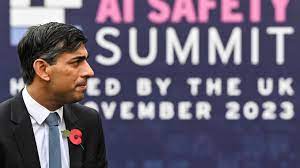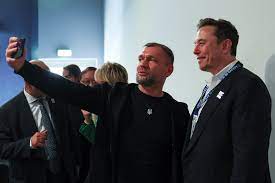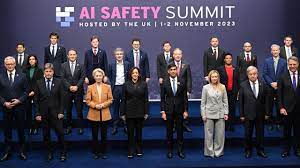In an unprecedented gathering, leaders from 28 nations, including British Prime Minister Rishi Sunak, U.S. Vice President Kamala Harris, and European Commission President Ursula von der Leyen, convened at the inaugural two-day AI Safety Summit hosted at Bletchley Park, England.
The summit, designed to confront the risks accompanying the swift evolution of artificial intelligence (AI), concluded with a resolute commitment to a “shared agreement and responsibility” concerning AI-related risks.

Plans for further meetings later this year in South Korea and France were also announced, solidifying a global effort to address the multifaceted challenges presented by the burgeoning field of AI.
The diverse group of leaders engaged in comprehensive discussions surrounding the safety, ethics, and responsible development of AI technology.
European Commission President Ursula von der Leyen, U.N. Secretary-General António Guterres, and other influential figures provided insights into their respective testing models, emphasizing the need for a collaborative and ethical approach to navigate the uncharted territory of AI development.
Thursday’s session delved into more focused conversations among a smaller group of countries characterized by “shared values.”
Representatives from the EU, the U.N., Italy, Germany, France, and Australia participated in discussions that sought to refine strategies for ensuring the responsible growth of AI.
British Prime Minister Rishi Sunak, a central figure in the summit, underscored that an immediate, sweeping regulatory approach might not be the most effective, aligning with sentiments expressed by some AI companies concerned about stringent regulations hindering the technology’s full potential.
During a pivotal news conference, Sunak unveiled a groundbreaking agreement among participating countries to collaborate on the pre-release testing of new AI models, highlighting a collective commitment to ensuring the safety and ethical considerations of AI advancements.
Noteworthy participants in this collaborative effort included the U.S., EU, France, Germany, Italy, Japan, South Korea, Singapore, Canada, and Australia.
However, China chose not to participate in the second day of talks, indicating potential challenges in achieving a truly global consensus on AI development principles.
The summit’s conclusion featured a high-profile discussion between Rishi Sunak and entrepreneur Elon Musk, taking place in front of a select audience of invited business leaders and journalists.

Musk commended the inclusion of China in the AI safety agreement, emphasizing the critical importance of international collaboration between the U.S., the U.K., and China to promote AI safety.
While the immediate implementation of comprehensive regulations was deemed not to be the preferred course of action, the commitment to collaborative testing of new AI models represents a significant stride toward fostering responsible AI development on a global scale.
The discussions at the summit underscored the pressing need for international cooperation in addressing the ethical and safety challenges arising from the ever-evolving field of artificial intelligence.
The landmark agreement to collectively test AI models before their release reflects a shared commitment to mitigating potential risks associated with AI development.
This collaborative approach acknowledges the dynamic nature of AI technology and the need for ongoing evaluation and adjustment to ensure responsible and ethical deployment.
The inclusion of China in the initial agreement and subsequent discussions suggests a recognition of the global nature of AI development and the necessity of involving all major players in shaping the future trajectory of this transformative technology.
The absence of China from the second day of talks, however, raises questions about the challenges in achieving a unified global stance on AI safety and regulations.

In conclusion, the AI Safety Summit marks a significant milestone in the collaborative effort to navigate the challenges posed by artificial intelligence.
The commitment to shared responsibility, ongoing dialogue, and collaborative testing reflects a recognition of the global impact of AI and the imperative to approach its development with caution and foresight.
As the world grapples with the transformative potential of AI, the outcomes of this summit signal a step toward a more coordinated and responsible approach to harnessing the power of artificial intelligence for the benefit of humanity.

